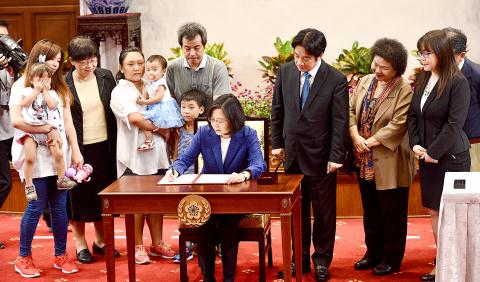President Tsai Ing-wen (蔡英文) yesterday signed into law the Act on Savings Accounts for the Education and Development of Children and Teenagers (兒童及少年未來教育與發展帳戶條例) in a ceremony at the Presidential Office in Taipei.
In her dedication, Tsai said that the act, which the Legislative Yuan passed last month, was part of her original electoral platform.
The legislation encourages disadvantaged families to save for their children’s future by creating publicly subsidized saving accounts, she said.

Photo: Peter Lo, Taipei Times
For each annual deposit the parents put in their child’s account, the government is to furnish an identical sum capped at NT$15,000 (US$504), Tsai said.
Under the scheme, a child could receive up to NT$550,000 from their account upon reaching the age of maturity, or the equivalent of four years of college tuition, she said.
If an account beneficiary participates in a youth business start-up program, they would receive a NT$10,000 monthly subsidy in addition to their income, which would reduce the debt burden from tuition loans and help young people launch businesses, she said.
The trial version of the program implemented last year has saved more than NT$60 million for its 3,000 participating families, she said.
“Above all, the program encourages families to confront temporary economic hardships with a positive attitude that would help carry the family through and keep the children on the right path,” she said.
The government would ensure that the program receives sufficient funding, Tsai said, adding that it is the government’s responsibility to guarantee equal opportunities for all.
The administration hopes to broaden the program’s eligibility requirements to give more disadvantaged children a head start, she said.
“While reforms are not instantaneous, methodically and patiently making policy will surely lead to results,” she said.
The administration would continue to tackle the issue of poverty by providing people from disadvantaged backgrounds with education, housing subsidies and vocational training, she said.
“Signing the act into law is a new beginning and we will surely forge a path forward,” she said.
Two disadvantaged families enrolled in the program were invited to witness the signing.
Parent Liu Yu-shih (劉妤詩) said she had been saving for her children each month and hoped she could provide them with a better future, before thanking the government for enacting the policy.

ANOTHER EMERGES: The CWA yesterday said this year’s fourth storm of the typhoon season had formed in the South China Sea, but was not expected to affect Taiwan Tropical Storm Gaemi has intensified slightly as it heads toward Taiwan, where it is expected to affect the country in the coming days, the Central Weather Administration (CWA) said yesterday. As of 8am yesterday, the 120km-radius storm was 800km southeast of Oluanpi (鵝鑾鼻), Taiwan’s southernmost tip, moving at 9kph northwest, the agency said. A sea warning for Gaemi could be issued tonight at the earliest, it said, adding that the storm is projected to be closest to Taiwan on Wednesday or Thursday. Gaemi’s potential effect on Taiwan remains unclear, as that would depend on its direction, radius and intensity, forecasters said. Former Weather Forecast

As COVID-19 cases in Japan have been increasing for 10 consecutive weeks, people should get vaccinated before visiting the nation, the Centers for Disease Control (CDC) said. The centers reported 773 hospitalizations and 124 deaths related to COVID-19 in Taiwan last week. CDC Epidemic Intelligence Center Director Guo Hung-wei (郭宏偉) on Tuesday said the number of weekly COVID-19 cases reported in Japan has been increasing since mid-May and surpassed 55,000 cases from July 8 to July 14. The average number of COVID-19 patients at Japan’s healthcare facilities that week was also 1.39 times that of the week before and KP.3 is the dominant

The Chinese Communist Party’s (CCP) working group for Taiwan-related policies is likely to be upgraded to a committee-level body, a report commissioned by the Mainland Affairs Council (MAC) said. As Chinese President Xi Jinping (習近平) is increasingly likely to upgrade the CCP’s Central Leading Group for Taiwan Affairs, Taiwanese authorities should prepare by researching Xi and the CCP, the report said. At the third plenary session of the 20th Central Committee of the CCP, which ended on Thursday last week, the party set a target of 2029 for the completion of some tasks, meaning that Xi is likely preparing to

US-CHINA TRADE DISPUTE: Despite Beijing’s offer of preferential treatment, the lure of China has dimmed as Taiwanese and international investors move out Japan and the US have become the favored destinations for Taiwanese graduates as China’s attraction has waned over the years, the Ministry of Labor said. According to the ministry’s latest income and employment advisory published this month, 3,215 Taiwanese university graduates from the class of 2020 went to Japan, surpassing for the first time the 2,881 graduates who went to China. A total of 2,300 graduates from the class of 2021 went to the US, compared with the 2,262 who went to China, the document showed. The trend continued for the class of 2023, of whom 1,460 went to Japan, 1,334 went to